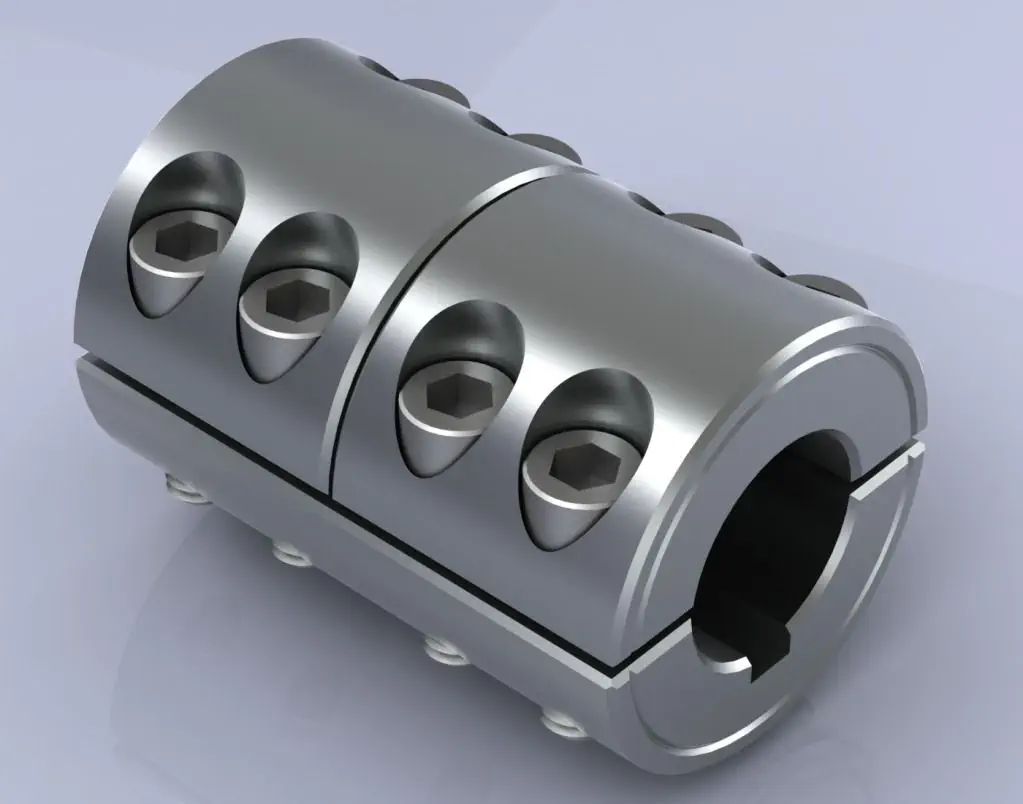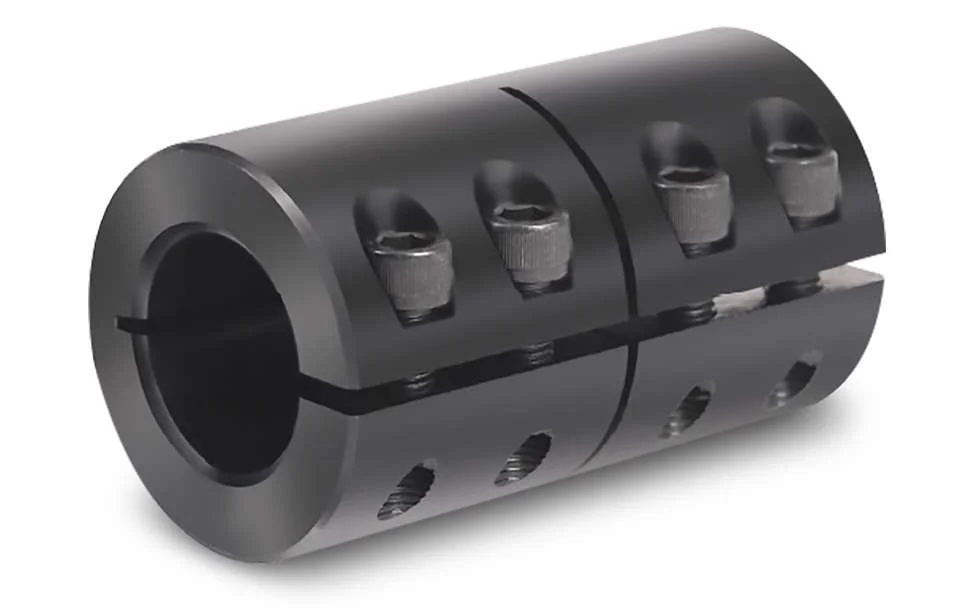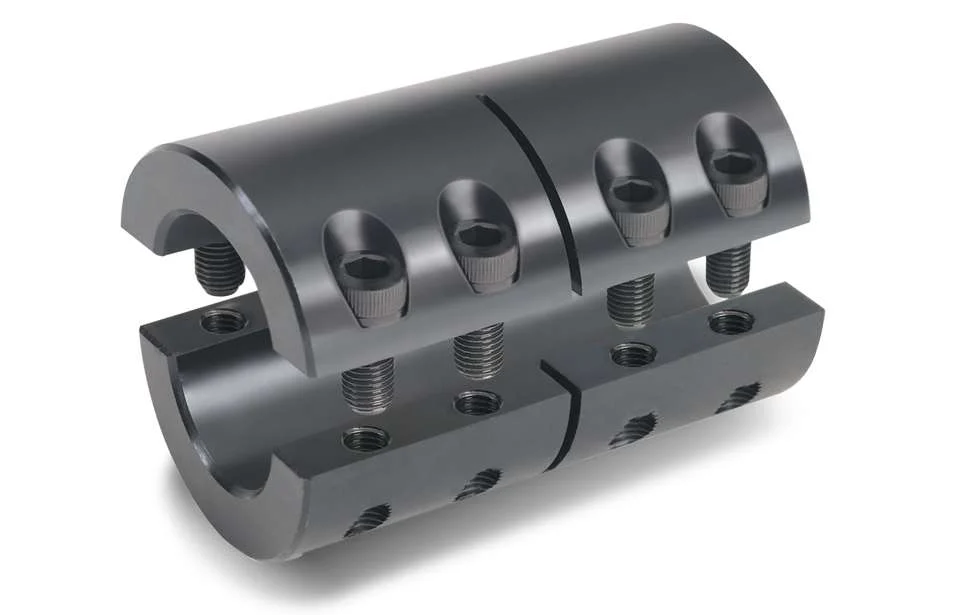Product Description
GW Type Coupling Rigid Shaft Coupling GW-44X65.5
GW Type Coupling Rigid Shaft Coupling GW-44X65.5
|
model parameter |
common bore diameter d1,d2 |
ΦD |
L |
LF |
LP |
d3 |
S |
tightening screw torque(N.M) |
|
GW-19X34 |
3,4,5,6,6.35,7,8 |
19 |
34 |
9.1 |
5.2 |
Φ9 |
1.8 |
1 |
|
GW-26X44.5 |
5,6,6.35,7,8,9,9.525,10,11,12,14 |
26 |
44.5 |
11.65 |
6.5 |
Φ12.5 |
2.6 |
1.5 |
|
GW-32X54 |
5,6,6.35,7,8,9,9.525,10,11,12,12.7,14,15, |
32 |
54 |
12.25 |
9.5 |
Φ15 |
3.5 |
1.5 |
|
GW-34X58 |
5,6,6.35,7,8,9,9.525,10,11,12,12.7,14,15,16 |
34 |
58 |
14.25 |
9.5 |
Φ16 |
3.5 |
2.5 |
|
GW-39X65.5 |
8,9,9.525,10,11,12,12.7,14,15,16,17,18,19 |
39 |
65.5 |
14.9 |
11.2 |
Φ19.3 |
4.5 |
2.5 |
|
GW-44X65.5 |
8,9,9.525,10,11,12,12.7,14,15,16,17,18,19,20,22,24 |
44 |
65.5 |
14.9 |
11.2 |
Φ22.5 |
4.5 |
2.5 |
|
GW-50X80 |
8,9,9.525,10,11,12,12.7,14,15,16,17,18,19,20,22,24,25 |
50 |
80 |
20.6 |
12.2 |
Φ23 |
4.8 |
7 |
|
GW-56X83 |
10,12,14,15,16,17,18,19,20,22,24,25,28,30,32 |
56 |
83 |
19.75 |
13.5 |
Φ32.5 |
5.5 |
7 |
|
GW-68X97 |
12,14,15,16,17,18,19,20,22,24,25,28,30,32,35,38 |
68 |
97 |
23.35 |
15.7 |
Φ38.3 |
6.3 |
12 |
|
GW-82X128 |
17,18,19,20,22,24,25,28,30,32,35,38,40,42 |
82 |
128 |
30 |
22 |
Φ45.5 |
8 |
20 |
/* March 10, 2571 17:59:20 */!function(){function s(e,r){var a,o={};try{e&&e.split(“,”).forEach(function(e,t){e&&(a=e.match(/(.*?):(.*)$/))&&1

Industry Standards and Certifications for Rigid Shaft Couplings
Yes, there are industry standards and certifications that apply to rigid shaft couplings to ensure their quality, performance, and safety. Some of the common standards and certifications include:
- ISO 14691: This International Organization for Standardization (ISO) standard specifies the requirements and dimensions for metallic straight-toothed rigid couplings with external clamping for shaft connections.
- ANSI/AGMA 9002-C16: The American Gear Manufacturers Association (AGMA) standard covers measurement methods for evaluating the torsional stiffness of rigid couplings.
- API 671: This American Petroleum Institute (API) standard applies to special-purpose couplings used in petroleum, chemical, and gas industry services, ensuring reliable operation and safety.
- DNV GL: Rigid couplings used in marine and offshore applications may require certification from DNV GL, an international accredited registrar and classification society.
- ATEX: For couplings used in explosive atmospheres, compliance with the ATEX directive is crucial to ensure that the coupling does not become a source of ignition.
When selecting a rigid shaft coupling, it is essential to look for products that comply with these relevant industry standards and certifications. Meeting these standards guarantees that the couplings have undergone rigorous testing and adhere to recognized quality and safety guidelines.

How do rigid shaft couplings compare to flexible couplings in terms of torque transmission and misalignment handling?
Rigid shaft couplings and flexible couplings differ in their ability to handle torque transmission and misalignment. Here’s a comparison of these aspects:
- Torque Transmission: Rigid shaft couplings offer excellent torque transmission due to their solid construction. They efficiently transmit high torque loads without significant power loss. Flexible couplings, on the other hand, may have some inherent power loss due to their flexibility.
- Misalignment Handling: Flexible couplings excel in compensating for misalignment between shafts. They can accommodate angular, parallel, and axial misalignments, reducing stress on connected equipment. Rigid couplings are limited in their misalignment compensation, primarily handling minimal misalignments. Significant misalignment can lead to increased wear and premature failure.
The choice between rigid and flexible couplings depends on the specific requirements of the application. If precise torque transmission and minimal misalignment are priorities, rigid couplings may be suitable. However, if misalignment compensation and vibration dampening are crucial, flexible couplings are a better option.

Advantages of Rigid Shaft Couplings Compared to Other Coupling Types
Rigid shaft couplings offer several advantages over other types of couplings, making them suitable for specific applications where these characteristics are essential:
- Efficient Torque Transmission: Rigid couplings provide a direct and efficient transfer of torque from one shaft to another, minimizing power loss and maximizing the system’s overall efficiency.
- Precision and Accuracy: Due to their solid and inflexible design, rigid shaft couplings maintain precise shaft alignment, ensuring accurate and consistent performance in precision machinery and instruments.
- High Torque and Speed Capacity: Rigid couplings can handle high torque loads and high-speed applications without significant wear or fatigue, making them suitable for heavy-duty industrial systems.
- Simple Design: Rigid couplings have a straightforward design, consisting of few components, which makes them easy to install, inspect, and maintain.
- No Backlash: Since rigid couplings do not have any flexibility or play, they do not introduce backlash into the system, providing precise and immediate responsiveness to changes in torque and speed.
- Cost-Effectiveness: Rigid shaft couplings are generally more affordable than some of the more complex flexible coupling types, making them a cost-effective solution for applications with minimal shaft misalignments.
- High Temperature and Corrosion Resistance: Depending on the material used, rigid couplings can offer high-temperature resistance and corrosion resistance, making them suitable for harsh environments.
- Stability and Reliability: Rigid couplings provide a stable and reliable connection between shafts, reducing the risk of failure or breakdown in critical systems.
Despite their advantages, rigid couplings are not suitable for applications where shaft misalignment or shock absorption is a concern. In cases where misalignment is expected or where some degree of flexibility is required to protect the system from shocks and vibrations, flexible coupling types such as beam couplings, bellows couplings, or jaw couplings are more appropriate choices.


editor by CX 2024-01-19